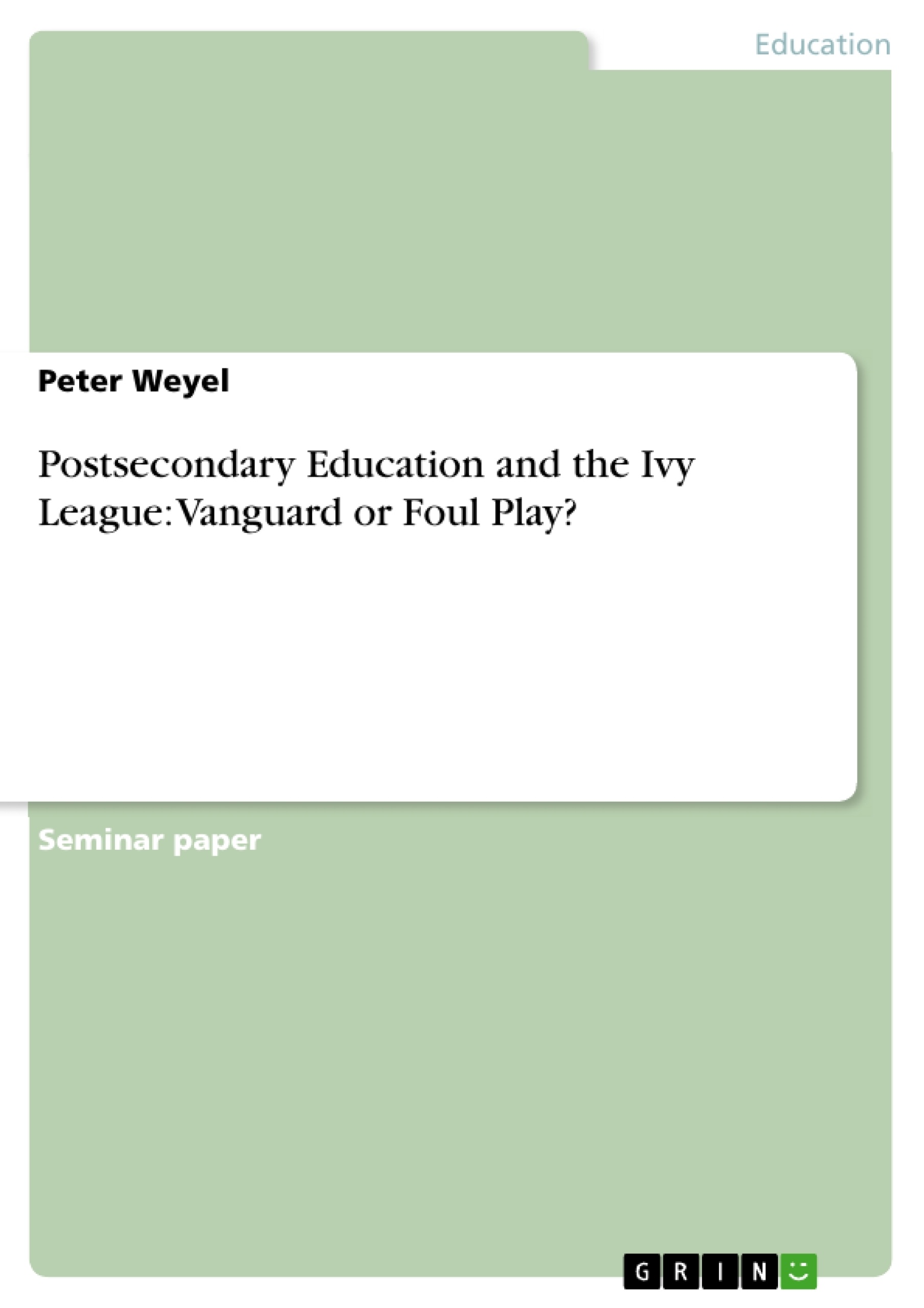This seminar paper deals with the question whether the American system of privatized postsecondary education (often referred to as the 'Ivy League') might be an exemplary approach to an optimized educational system.
To answer this question, two perspectives are taken into account. On the one hand the effectiveness of the system is considered by considering a market model of education. On the other hand the efficiency of private postsecondary education will be examined. Hence, chapter 2 will define the term ‘Ivy League’ and present a market model of education. In section 3, the focus shifts to whether the system follows the principles of meritocracy and equality by examining influencing factors of the admission process including the role of high school education. Finally a conclusive summary of the findings is provided.
Inhaltsverzeichnis (Table of Contents)
- Introduction
- The Role of the Ivy League in Higher Education
- Terminology
- Changing Selectivity and the Market for Education
- The Issue of Equality in Admission
- Conceptual Basics of Admission and Merit
- Factors in being admitted
- The Financial Burden
- The Influence of High School Education
- Concluding Summary
Zielsetzung und Themenschwerpunkte (Objectives and Key Themes)
This paper investigates the role of the Ivy League in higher education, specifically examining how these prestigious institutions navigate the complexities of selectivity, equality in admission, and the financial burden of attending.
- The changing landscape of higher education and the increasing demand for highly skilled individuals
- The Ivy League's unique position within the higher education system and its impact on admission practices
- The challenges of achieving equal access to education amidst financial constraints and varying socioeconomic backgrounds
- The influence of high school education on college admissions and the factors considered in the admission process
Zusammenfassung der Kapitel (Chapter Summaries)
The Introduction highlights the dynamic and complex nature of the current business environment, emphasizing the crucial role of higher education in equipping individuals with the skills necessary for success. This section discusses the growing demand for highly qualified employees in the EU, particularly in non-productive industries. The chapter concludes with a projection of labor force trends in the EU-25, showing a projected increase in high- and medium-level qualified workers and a decline in those with low-level qualifications.
The second chapter delves into the role of the Ivy League in higher education. It begins by defining key terminology related to the Ivy League, exploring its history, and discussing its significance in shaping the American higher education landscape. The chapter then examines the evolution of admission practices, the market forces influencing them, and the issues of equality in the admission process. The concept of merit and its application in admissions are discussed, along with factors influencing the admission process. The chapter concludes with an analysis of the financial burden associated with attending Ivy League institutions.
Schlüsselwörter (Keywords)
Key concepts and terms explored in this paper include: higher education, Ivy League, admission practices, selectivity, equality, merit, financial burden, socioeconomic status, high school education, skill supply forecast, and labor force trends.
Frequently Asked Questions
What is the main question addressed regarding the Ivy League?
The paper investigates whether the American system of privatized postsecondary education, specifically the Ivy League, serves as an exemplary model for an optimized educational system.
Does the Ivy League follow the principles of meritocracy?
The study examines influencing factors in the admission process to evaluate whether selectivity truly aligns with meritocracy or if socioeconomic background plays a disproportionate role.
What is the "financial burden" discussed in the paper?
It refers to the high costs of attending these prestigious private institutions and how this financial barrier impacts equality and access for students from diverse backgrounds.
How does high school education influence Ivy League admissions?
The paper analyzes how the quality and type of high school education serve as a significant factor in the competitive admission process of Ivy League schools.
What are the labor force trends mentioned in the introduction?
The introduction highlights a growing demand for high- and medium-level qualified workers in the EU, emphasizing the increasing importance of elite higher education in the global market.
- Citation du texte
- Dipl. Kfm. Peter Weyel (Auteur), 2010, Postsecondary Education and the Ivy League: Vanguard or Foul Play?, Munich, GRIN Verlag, https://www.grin.com/document/170558



